- Home
- Jack London
The Call of the Wild and Selected Stories Page 7
The Call of the Wild and Selected Stories Read online
Page 7
And then, suddenly, without warning, uttering a cry that was inarticulate and more like the cry of an animal, John Thornton sprang upon the man who wielded the club. Hal was hurled backward, as though struck by a falling tree. Mercedes screamed. Charles looked on wistfully, wiped his watery eyes, but did not get up because of his stiffness.
John Thornton stood over Buck, struggling to control himself, too convulsed with rage to speak.
“If you strike that dog again, I’ll kill you,” he at last managed to say in a choking voice.
“It’s my dog,” Hal replied, wiping the blood from his mouth as he came back. “Get out of my way, or I’ll fix you. I’m going to Dawson.”
Thornton stood between him and Buck, and evinced no intention of getting out of the way. Hal drew his long hunting knife. Mercedes screamed, cried, laughed, and manifested the chaotic abandonment of hysteria. Thornton rapped Hal’s knuckles with the ax handle, knocking the knife to the ground. He rapped his knuckles again as he tried to pick it up. Then he stooped, picked it up himself, and with two strokes cut Buck’s traces.
He had no fight left in him. Besides, his hands were full with his sister, or his arms, rather, while Buck was too near dead to be of further use in hauling the sled. A few minutes later they pulled out from the bank and down the river. Buck heard them go and raised his head to see. Pike was leading, Sol-leks was at the wheel, and between were Joe and Teek. They were limping and staggering. Mercedes was riding the loaded sled. Hal guided at the gee pole, and Charles stumbled along in the rear.
As Buck watched them, Thornton knelt beside him and with rough, kindly hands searched for broken bones. By the time his search had disclosed nothing more than many bruises and a state of terrible starvation, the sled was a quarter of a mile away. Dog and man watched it crawling along over the ice. Suddenly, they saw its back end drop down, as into a rut, and the gee pole, with Hal clinging to it, jerk into the air. Mercedes’s scream came to their ears. They saw Charles turn and make one step to run back, and then a whole section of ice give way and dogs and humans disappear. A yawning hole was all that was to be seen. The bottom had dropped out of the trail.
John Thornton and Buck looked at each other.
“You poor devil,” said John Thornton, and Buck licked his hand.
6. FOR THE LOVE OF A MAN
When John Thornton froze his feet in the previous December, his partners had made him comfortable and left him to get well, going on themselves up the river to get out a raft of saw logs for Dawson. He was still limping slightly at the time he rescued Buck, but with the continued warm weather even the slight limp left him. And here, lying by the river bank through the long spring days, watching the running water, listening lazily to the songs of birds and the hum of nature, Buck slowly won back his strength.
A rest comes very good after one has traveled three thousand miles, and it must be confessed that Buck waxed lazy as his wounds healed, his muscles swelled out, and the flesh came back to cover his bones. For that matter, they were all loafing—Buck, John Thornton, and Skeet and Nig—waiting for the raft to come that was to carry them down to Dawson. Skeet was a little Irish setter who early made friends with Buck, who, in a dying condition, was unable to resent her first advances. She had the doctor trait which some dogs possess; and as a mother cat washes her kittens, so she washed and cleansed Buck’s wounds. Regularly, each morning after he had finished his breakfast, she performed her self-appointed task, till he came to look for her ministrations as much as he did for Thornton’s. Nig, equally friendly, though less demonstrative, was a huge black dog, half bloodhound and half deerhound, with eyes that laughed and a boundless good nature.
To Buck’s surprise these dogs manifested no jealousy toward him. They seemed to share the kindliness and largeness of John Thornton. As Buck grew stronger they enticed him into all sorts of ridiculous games, in which Thornton himself could not forbear to join; and in this fashion Buck romped through his convalescence and into a new existence. Love, genuine passionate love, was his for the first time. This he had never experienced at Judge Miller’s down in the sun-kissed Santa Clara Valley. With the Judge’s sons, hunting and tramping, it had been a working partnership; with the Judge’s grandsons, a sort of pompous guardianship; and with the Judge himself, a stately and dignified friendship. But love that was feverish and burning, that was adoration, that was madness, it had taken John Thornton to arouse.
This man had saved his life, which was something; but, further, he was the ideal master. Other men saw to the welfare of their dogs from a sense of duty and business expediency; he saw to the welfare of his as if they were his own children, because he could not help it. And he saw further. He never forgot a kindly greeting or a cheering word, and to sit down for a long talk with them (gas, he called it) was as much his delight as theirs. He had a way of taking Buck’s head roughly between his hands, and resting his own head upon Buck’s, of shaking him back and forth, the while calling him ill names that to Buck were love names. Buck knew no greater joy than that rough embrace and the sound of murmured oaths, and at each jerk back and forth it seemed that his heart would be shaken out of his body so great was its ecstasy. And when, released, he sprang to his feet, his mouth laughing, his eyes eloquent, his throat vibrant with unuttered sound, and in that fashion remained without movement, John Thornton would reverently exclaim, “God! you can all but speak!”
Buck had a trick of love expression that was akin to hurt. He would often seize Thornton’s hand in his mouth and close so fiercely that the flesh bore the impress of his teeth for some time afterward. And as Buck understood the oaths to be love words, so the man understood this feigned bite for a caress.
For the most part, however, Buck’s love was expressed in adoration. While he went wild with happiness when Thornton touched him or spoke to him, he did not seek these tokens. Unlike Skeet, who was wont to shove her nose under Thornton’s hand and nudge and nudge till petted, or Nig, who would stalk up and rest his great head on Thornton’s knee, Buck was content to adore at a distance. He would lie by the hour, eager, alert, at Thornton’s feet, looking up into his face, dwelling upon it, studying it, following with keenest interest each fleeting expression, every movement or change of feature. Or, as chance might have it, he would lie farther away, to the side or rear, watching the outlines of the man and the occasional movements of his body. And often, such was the communion in which they lived, the strength of Buck’s gaze would draw John Thornton’s head around, and he would return the gaze, without speech, his heart shining out of his eyes as Buck’s heart shone out.
For a long time after his rescue, Buck did not like Thornton to get out of his sight. From the moment he left the tent to when he entered it again, Buck would follow at his heels. His transient masters since he had come into the Northland had bred in him a fear that no master could be permanent. He was afraid that Thornton would pass out of his life as Perrault and François and the Scotch half-breed had passed out. Even in the night, in his dreams, he was haunted by this fear. At such times he would shake off sleep and creep through the chill to the flap of the tent, where he would stand and listen to the sound of his master’s breathing.
But in spite of this great love he bore John Thornton, which seemed to bespeak the soft, civilizing influence, the strain of the primitive, which the Northland had aroused in him, remained alive and active. Faithfulness and devotion, things born of fire and roof, were his; yet he retained his wildness and wiliness. He was a thing of the wild, come in from the wild to sit by John Thornton’s fire, rather than a dog of the soft Southland stamped with the marks of generations of civilization. Because of his very great love, he could not steal from this man, but from any other man, in any other camp, he did not hesitate an instant; while the cunning with which he stole enabled him to escape detection.
His face and body were scored by the teeth of many dogs, and he fought as fiercely as ever and more shrewdly. Skeet and Nig were too good-natured for quarreling—besides,
they belonged to John Thornton; but the strange dog, no matter what the breed or valor, swiftly acknowledged Buck’s supremacy or found himself struggling for life with a terrible antagonist. And Buck was merciless. He had learned well the law of club and fang, and he never forwent an advantage or drew back from a foe he had started on the way to Death. He had lessoned from Spitz, and from the chief fighting dogs of the police and mail, and knew there was no middle course. He must master or be mastered; while to show mercy was a weakness. Mercy did not exist in the primordial life. It was misunderstood for fear, and such misunderstandings made for death. Kill or be killed, eat or be eaten, was the law; and this mandate, down out of the depths of Time, he obeyed.
He was older than the days he had seen and the breaths he had drawn. He linked the past with the present, and the eternity behind him throbbed through him in a mighty rhythm to which he swayed as the tides and seasons swayed. He sat by John Thornton’s fire, a broad-breasted dog, white-fanged and long-furred; but behind him were the shades of all manner of dogs, half wolves and wild wolves, urgent and prompting, tasting the savor of the meat he ate, thirsting for the water he drank, scenting the wind with him, listening with him and telling him the sounds made by the wild life in the forest, dictating his moods, directing his actions, lying down to sleep with him when he lay down, and dreaming with him and beyond him and becoming themselves the stuff of his dreams.
So peremptorily did these shades beckon him, that each day mankind and the claims of mankind slipped farther from him. Deep in the forest a call was sounding, and as often as he heard this call, mysteriously thrilling and luring, he felt compelled to turn his back upon the fire and the beaten earth around it, and to plunge into the forest, and on and on, he knew not where or why; nor did he wonder where or why, the call sounding imperiously, deep in the forest. But as often as he gained the soft unbroken earth and the green shade, the love for John Thornton drew him back to the fire again.
Thornton alone held him. The rest of mankind was as nothing. Chance travelers might praise or pet him; but he was cold under it all, and from a too demonstrative man he would get up and walk away. When Thornton’s partners, Hans and Pete, arrived on the long-expected raft, Buck refused to notice them till he learned they were close to Thornton; after that he tolerated them in a passive sort of way, accepting favors from them as though he favored them by accepting. They were of the same large type as Thornton, living close to the earth, thinking simply and seeing clearly; and ere they swung the raft into the big eddy by the sawmill at Dawson, they understood Buck and his ways, and did not insist upon an intimacy such as obtained with Skeet and Nig.
For Thornton, however, his love seemed to grow and grow. He, alone among men, could put a pack upon Buck’s back in the summer traveling. Nothing was too great for Buck to do, when Thornton commanded. One day (they had grubstaked themselves from the proceeds of the raft and left Dawson for the headwaters of the Tanana) the men and dogs were sitting on the crest of a cliff which fell away, straight down, to naked bedrock three hundred feet below. John Thornton was sitting near the edge, Buck at his shoulder. A thoughtless whim seized Thornton, and he drew the attention of Hans and Pete to the experiment he had in mind. “Jump, Buck!” he commanded, sweeping his arm out and over the chasm. The next instant he was grappling with Buck on the extreme edge, while Hans and Pete were dragging them back into safety.
“It’s uncanny,” Pete said, after it was over and they had caught their speech.
Thornton shook his head. “No, it is splendid, and it is terrible, too. Do you know, it sometimes makes me afraid.”
“I’m not hankering to be the man that lays hands on you while he’s around,” Pete announced conclusively, nodding his head toward Buck.
“Py Jingo!” was Hans’s contribution. “Not mineself either.”
It was at Circle City, ere the year was out, that Pete’s apprehensions were realized. “Black” Burton, a man evil-tempered and malicious, had been picking a quarrel with a tenderfoot at the bar, when Thornton stepped good-naturedly between. Buck, as was his custom, was lying in a corner, head on paws, watching his master’s every action. Burton struck out, without warning, straight from the shoulder. Thornton was sent spinning, and saved himself from falling only by clutching the rail of the bar.
Those who were looking on heard what was neither bark nor yelp, but a something which is best described as a roar, and they saw Buck’s body rise up in the air as he left the floor for Burton’s throat. The man saved his life by instinctively throwing out his arm, but was hurled backward to the floor with Buck on top of him. Buck loosed his teeth from the flesh of the arm and drove in again for the throat. This time the man succeeded only in partly blocking, and his throat was torn open. Then the crowd was upon Buck, and he was driven off; but while a surgeon checked the bleeding, he prowled up and down, growling furiously, attempting to rush in, and being forced back by an array of hostile clubs. A “miners’ meeting,” called on the spot, decided that the dog had sufficient provocation, and Buck was discharged. But his reputation was made, and from that day his name spread through every camp in Alaska.
Later on, in the fall of the year, he saved John Thornton’s life in quite another fashion. The three partners were lining a long and narrow poling boat down a bad stretch of rapids on the Forty Mile Creek. Hans and Pete moved along the bank, snubbing with a thin Manila rope from tree to tree, while Thornton remained in the boat, helping its descent by means of a pole, and shouting directions to the shore. Buck, on the bank, worried and anxious, kept abreast of the boat, his eyes never off his master.
At a particularly bad spot, where a ledge of barely submerged rocks jutted out into the river, Hans cast off the rope, and, while Thornton poled the boat out into the stream, ran down the bank with the end in his hand to snub the boat when it had cleared the ledge. This it did, and was flying downstream in a current as swift as a millrace, when Hans checked it with the rope and checked too suddenly. The boat flirted over and snubbed in to the bank bottom up, while Thornton, flung sheer out of it, was carried downstream toward the worst part of the rapids, a stretch of wild water in which no swimmer could live.
Buck had sprung in on the instant; and at the end of three hundred yards, amid a mad swirl of water, he overhauled Thornton. When he felt him grasp his tail, Buck headed for the bank, swimming with all his splendid strength. But the progress shoreward was slow, the progress downstream amazingly rapid. From below came the fatal roaring where the wild current went wilder and was rent in shreds and spray by the rocks which thrust through like the teeth of an enormous comb. The suck of the water as it took the beginning of the last steep pitch was frightful, and Thornton knew that the shore was impossible. He scraped furiously over a rock, bruised across a second, and struck a third with crushing force. He clutched its slippery top with both hands, releasing Buck, and above the roar of the churning water shouted: “Go, Buck! Go!”
Buck could not hold his own, and swept on downstream, struggling desperately, but unable to win back. When he heard Thornton’s command repeated, he partly reared out of the water, throwing his head high, as though for a last look, then turned obediently toward the bank. He swam powerfully and was dragged ashore by Pete and Hans at the very point where swimming ceased to be possible and destruction began.
They knew that the time a man could cling to a slippery rock in the face of that driving current was a matter of minutes, and they ran as fast as they could up the bank to a point far above where Thornton was hanging on. They attached the line with which they had been snubbing the boat to Buck’s neck and shoulders, being careful that it should neither strangle him nor impede his swimming, and launched him into the stream. He struck out boldly, but not straight enough into the stream. He discovered the mistake too late, when Thornton was abreast of him and a bare half-dozen strokes away while he was being carried helplessly past.
Hans promptly snubbed with the rope, as though Buck were a boat. The rope thus tightening on him in the
sweep of the current, he was jerked under the surface, and under the surface he remained till his body struck against the bank and he was hauled out. He was half drowned, and Hans and Pete threw themselves upon him, pounding the breath into him and the water out of him. He staggered to his feet and fell down. The faint sound of Thornton’s voice came to them, and though they could not make out the words of it, they knew that he was in his extremity. His master’s voice acted on Buck like an electric shock. He sprang to his feet and ran up the bank ahead of the men to the point of his previous departure.
Again the rope was attached and he was launched, and again he struck out, but this time straight into the stream. He had miscalculated once, but he would not be guilty of it a second time. Hans paid out the rope, permitting no slack, while Pete kept it clear of coils. Buck held on till he was on a line straight above Thornton; then he turned, and with the speed of an express train headed down upon him. Thornton saw him coming, and, as Buck struck him like a battering ram, with the whole force of the current behind him, he reached up and closed with both arms around the shaggy neck. Hans snubbed the rope around the tree, and Buck and Thornton were jerked under the water. Strangling, suffocating, sometimes one uppermost and sometimes the other, dragging over the jagged bottom, smashing against rocks and snags, they veered in to the bank.

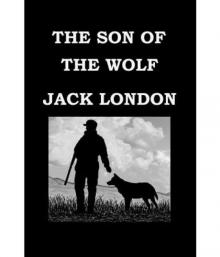 The Son of the Wolf
The Son of the Wolf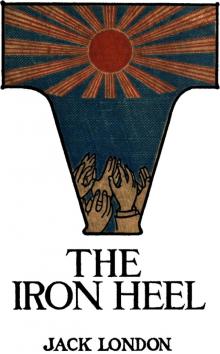 The Iron Heel
The Iron Heel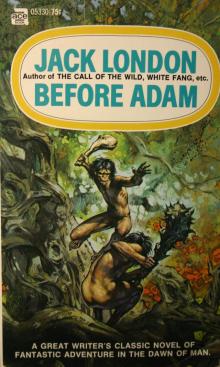 Before Adam
Before Adam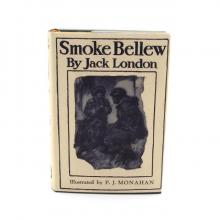 Smoke Bellew
Smoke Bellew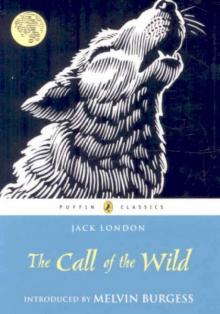 The Call of the Wild
The Call of the Wild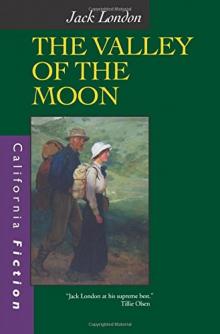 The Valley of the Moon Jack London
The Valley of the Moon Jack London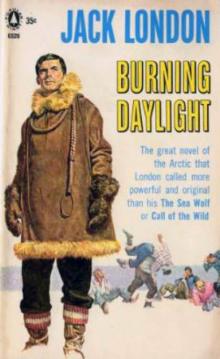 Burning Daylight
Burning Daylight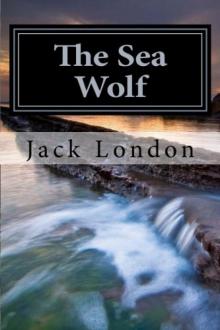 The Sea Wolf
The Sea Wolf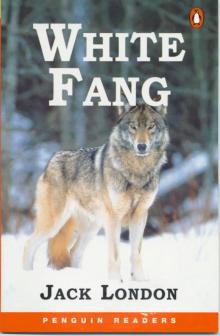 White Fang
White Fang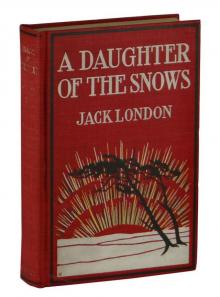 A Daughter of the Snows
A Daughter of the Snows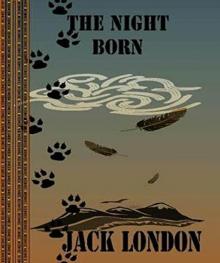 The Night-Born
The Night-Born A Son Of The Sun
A Son Of The Sun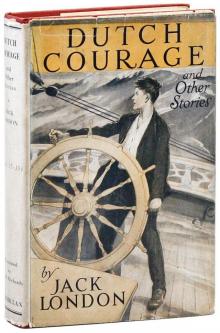 Dutch Courage and Other Stories
Dutch Courage and Other Stories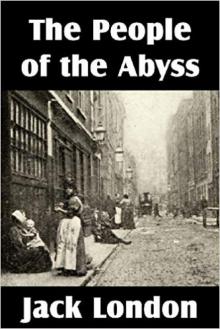 The People of the Abyss
The People of the Abyss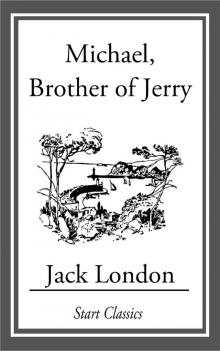 Michael, Brother of Jerry
Michael, Brother of Jerry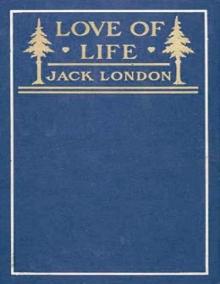 Love of Life, and Other Stories
Love of Life, and Other Stories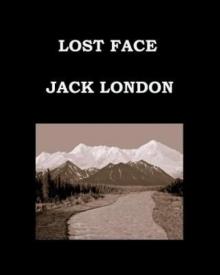 Lost Face
Lost Face The Road
The Road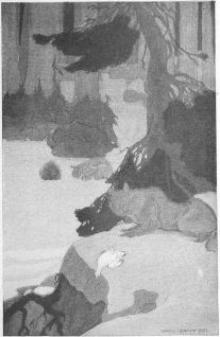 Love of Life
Love of Life The Turtles of Tasman
The Turtles of Tasman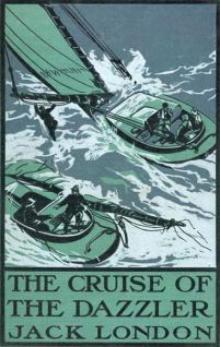 The Cruise of The Dazzler
The Cruise of The Dazzler The Heathen
The Heathen The Scab
The Scab The Faith of Men
The Faith of Men Adventure
Adventure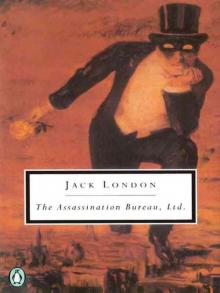 The Assassination Bureau, Ltd.
The Assassination Bureau, Ltd.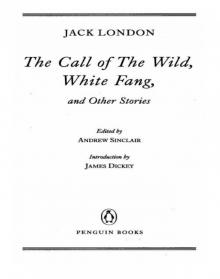 The Call of the Wild, White Fang, and Other Stories
The Call of the Wild, White Fang, and Other Stories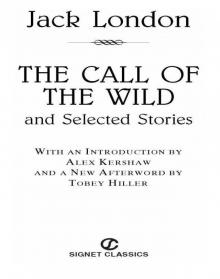 The Call of the Wild and Selected Stories
The Call of the Wild and Selected Stories Jerry of the Islands
Jerry of the Islands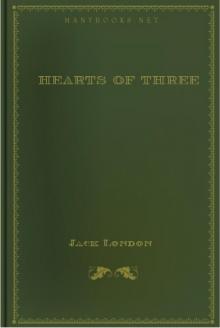 Hearts of Three
Hearts of Three The House of Pride
The House of Pride Moon-Face and Other Stories
Moon-Face and Other Stories Children of the Frost
Children of the Frost South Sea Tales
South Sea Tales The Strength of the Strong
The Strength of the Strong The Jacket (The Star-Rover)
The Jacket (The Star-Rover) The Little Lady of the Big House
The Little Lady of the Big House John Barleycorn
John Barleycorn ADaugter of Snows
ADaugter of Snows The Mutiny of the Elsinore
The Mutiny of the Elsinore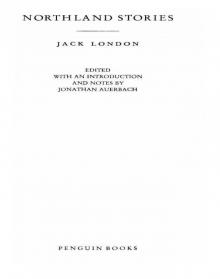 Northland Stories
Northland Stories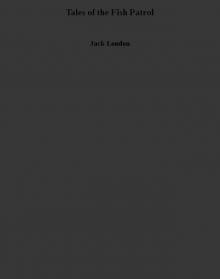 Tales of the Fish Patrol
Tales of the Fish Patrol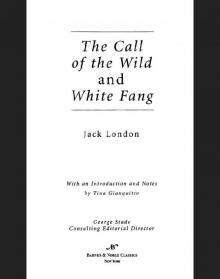 Call of the Wild and White Fang (Barnes & Noble Classics Series)
Call of the Wild and White Fang (Barnes & Noble Classics Series) The Valley of the Moon
The Valley of the Moon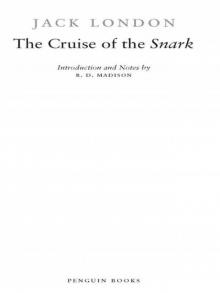 The Cruise of the Snark
The Cruise of the Snark The Game
The Game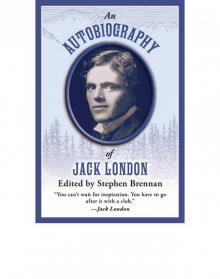 An Autobiography of Jack London
An Autobiography of Jack London